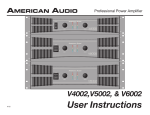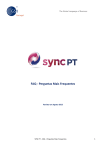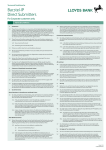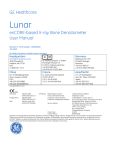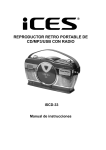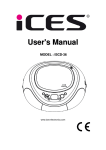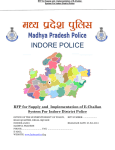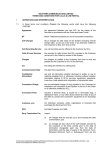Download Guide to becoming a Direct Debit Originator
Transcript
Guide to becoming a Direct Debit Originator Page 1 of 13 APT, Financial House, 14 Barclay Road, Croydon, Surrey, CR0 1JN t: 020 8760 9898 f: 020 8760 9798 [email protected] www.aptbacs.co.uk Introduction The aim of this document is to provide an organisation, that wish to become a Direct Debit Originator, with a concise understanding of how the Direct Debit Scheme works. It provides basic information on the various aspects of the Direct Debit Scheme from application to the processing of their Direct Debit files to BACS. Full details of the Direct Debit Rules are given from the Originator‘s Guide and Rules to the Direct Debit Scheme available from the Sponsoring bank. APT can provide your organisation with a complete consultancy service to make your application for Direct Debit Originator’s status as easy and painless as possible. We can also provide technical expertise and advice on how to automate your direct debit operation. APT is proposing to release, a Direct Debit Automated System (DDAS) to maintain Direct Debit information and details of Payers, produce the file for your Direct Debit collection and in conjunction with our BACSTEL-iP compliant software, Connect-iP, submit your file to BACS for processing. 10 STEPS TO COLLECTING DIRECT DEBITS VIA BACS STEP 1 Becoming A Direct Debit Originator STEP 6 Preparation of BACS File STEP 2 Documents for Approval STEP 7 Submission of BACS FILE STEP 3 Lodgement of Direct Debit Instruction (DDI) STEP 8 STEP 4 AUDDIS STEP 5 Collection Process Page 2 of 13 BACS Reports STEP 9 Important Timescales STEP 10 APT additional Services APT, Financial House, 14 Barclay Road, Croydon, Surrey, CR0 1JN t: 020 8760 9898 f: 020 8760 9798 [email protected] www.aptbacs.co.uk STEP 1 – Becoming an Originator An organisation that wishes to collect direct debits first needs to become an Originator. The Originator must have a registered office in the UK and a UK sterling bank account. Its bank will consider the request to Sponsor the organisation as a Direct Debit Originator, but this will be subject to the bank’s assessment of its suitability. Consideration will be given to its: Contractual capacity Financial standing The quality of its administrative control Length of time the organisation has been established. As a condition of participation of the Direct Debit Scheme, an organisation must execute a standard form of Indemnity obtained from its Sponsoring Bank. The purpose of the Indemnity is to underwrite the protection offered to the Payer under the Guarantee. This liability is unlimited in time and monetary amount. Standard Originator Set-Up This is the process by which Originators are registered and prepared for Direct Debit collection. The following should be taken into consideration when completing the Direct Debit Originator Application form, which can be obtained from its Sponsoring Bank. Originator’s name – this should be the registered name of the organisation. If an organisation has more than one registered name under which it wishes to collect direct debits, a separate application must be made for each trading name. Account details – Collected funds must be credited to an account in the name of the Originator held by the Sponsoring bank If the application is accepted by the Sponsoring Bank, the Originator will be allocated a unique Originator Identification Number (OIN) for each registered name. This number must be quoted on all Direct Debit Instructions (DDIs) and the file sent to BACS for processing. Following the issue of an OIN, the Originator has the option to apply to be an Originator under the AUDDIS rules (See Step 4). A separate application form has to be completed and returned to the Sponsoring bank. The Originator must allow a minimum of 4 weeks from when their OIN is set up on the BACS database, before they can lodge their first Direct Debit Instruction (DDI). Page 3 of 13 APT, Financial House, 14 Barclay Road, Croydon, Surrey, CR0 1JN t: 020 8760 9898 f: 020 8760 9798 [email protected] www.aptbacs.co.uk STEP 2 – Documents for approval In order to operate the Direct Debit scheme, various documents will be required which must be approved by the bank before Originator status will be granted. Some or all of the following documents may be needed. Communication to its customers inviting them to become Direct Debit payers Information addressed by the Originator and Banks to Payers The Direct Debit Instruction (DDI) to be completed by its Payers Confirmation Letter (if using the Paperless Direct Debit Service) Advance Notice Communications regarding the amalgamation of payments Any sequence of operations, in so far as these operations involve Payers or Banks Format of BACS input file, including usage of the full range of transaction codes (see Step 6) The Direct Debit Instruction (DDI) This is the method by which the Originator obtains the Payer’s authority to debit his account. DDI can be obtained and lodged in three separate distinct ways: Standard DDI – a paper DDI is signed by the Payer and lodged by the Originator with the Paying Bank AUDDIS - a paper DDI signed by the Payer is obtained, and the information is lodged with the paying bank electronically, the paper copy remaining with the Originator Paperless DDI - the DDI is completed electronically or over the telephone and lodged under AUDDIS The Direct Debit Guarantee Provides an assurance to the Payers that any monies taken in error by the Originator or the Paying Bank will be immediately refunded by the Payer’s Bank. Confirms to the Payer that he may cancel a direct debit at any time States the period of Advance Notice agreed to be given to the Payer This Guarantee must be provided to the Payer and can form part of the following documents: DDI as a tear off portion to be retained by the Payer Advance Notice Other correspondence issued in respect of the application Page 4 of 13 APT, Financial House, 14 Barclay Road, Croydon, Surrey, CR0 1JN t: 020 8760 9898 f: 020 8760 9798 [email protected] www.aptbacs.co.uk Step 2 – Documents for Approval Advance Notice Is the method by which an Originator gives notice to the Payer before the first Direct Debit is collected. Any changes to the following will also require an Advance Notice to be sent to the Payer The amount to be collected Due date Frequency of collection The Advance Notice must be a clear and unambiguous personalised advice and can be written, in an electronic form or given verbally. The Originator may agree the period of Advance Notice with the Payer or in the absence of an agreement, a minimum of 10 working days plus postal time must be given. If the Advance Notice is given by means of a written notification, it can be given to the Payer within the following documentation: A letter addressed to the Payer In a schedule where dates/ amounts are known in advance In a statement * In an invoice * Within a contract between the Originator and the Payer * These documents must clearly display that collection is for Direct Debit, the amount to be debited and the collection due date. STEP 3 - Completion & Lodgement of DDI The DDI is the authority given by the Payer to his Paying Bank to allow the Originator to collect direct debits from his account. Clear instruction must be given to the Payer to return the completed DDI to the Originator. If the Originator is using the Paperless Direct Debit Service, it must issue a written confirmation letter to the Payer within 3 working days of the sign up. The Originator will lodge the DDI with the Payer’s account holding branch, either by sending in the paper DDI form or by AUDDIS. The paper DDI can be sent immediately or within 6 months from the date the DDI was signed by the payer before collection can commence. If using AUDDIS, an Originator must send a ‘0N’ to lodge the new instruction within 10 working days of the customer signing the DDI On receipt of the DDI, the Paying Bank will validate the DDI and is either accepted or rejected by the Paying Bank. Originator must allow a minimum of 5 working days from lodgement of the DDI before the first collection is presented. Page 5 of 13 APT, Financial House, 14 Barclay Road, Croydon, Surrey, CR0 1JN t: 020 8760 9898 f: 020 8760 9798 [email protected] www.aptbacs.co.uk Rejected DDI If rejected, the DDI is returned to the Originator immediately or no later than 3 working days from the date of receipt by the Paying Bank The Paying Bank will indicate the reasons why the DDI has been refused, but it also reserves the right to refuse a lodgement without giving a reason. When the Originator receives a rejected DDI, he must contact the Payer to arrange alternative payment method To reduce the incidents of rejected DDI due to incorrect bank details, APT offers an online web service to enable the Originator to validate the bank details provided by the Payer before the file is submitted to BACS for processing. Log on to our Validata web site www.aptiscd.co.uk for a free trial. Step 4 – AUDDIS (Automated Direct Debit Instruction Service) AUDDIS automates the lodgement of DDIs from the Originator to the Paying Bank by sending the information electronically via BACS. An Originator wishing to join AUDDIS must apply to its Sponsor to join the Scheme. An existing DD Originator must allow at least 4 months for their application to be approved. A new Originator must allow a minimum of 8 weeks for their application to be processed. A Test AUDDIS file must be submitted to BACS before live DDIs can be submitted. The test file must contain genuine bank details and contain 3 records of each transaction code 0N & 0C (zero N & C) AUDDIS Transaction Codes 0N - New DDI lodged 0S - Conversion of existing DDIs to AUDDIS 0C - Cancellation of an existing DDI An existing Originator can convert all its current DDI to AUDDIS by submitting the DDI records using a transaction code ‘0S’ only after a successful AUDDIS test file has been submitted to BACS. An new Originator must transmit a DDI to the Paying Bank within 10 working days of the customer signing the DDI using a transaction code ‘0N’ It is recommended that Originators do not collect the first Direct Debits from a Payer’s account, earlier than 5 working days after the lodgement of the DDI Once an Originator becomes an AUDDIS user, all DDI must be submitted via AUDDIS for that OIN Page 6 of 13 APT, Financial House, 14 Barclay Road, Croydon, Surrey, CR0 1JN t: 020 8760 9898 f: 020 8760 9798 [email protected] www.aptbacs.co.uk DDI Validation Most Paying Banks operate a modulus checking facility which validates the sort code and account number combination of any DDI applied to the Payer’s account. It is recommended that AUDDIS Originator apply modulus checking when applying the DDI to their own system as this will highlight erroneous details and enable the Originator to correct any invalid information before submitting a file to BACS for processing. Originators are also recommended to use the Industry Sorting Code Directory (ISCD) to validate sort code details. APT provides both the Modulus Checking and ISCD facilities as part of its BACSTEL-IP compliant software Connect-iP. In addition, ISCD is provided online with APT’s Validata. You can log on to our Validata website (www.aptiscd.co.uk) and check details online, or you can integrate the web service into your existing database and check the details from within your own system. Step 5 - Collection Process This is the process whereby the Originator collects direct debits from its payers who have completed a DDI. This process can start when the DDI has been successfully lodged with the Payer Bank. A new Originator is required to submit a Test DD file to BACS with 10 records of genuine bank details for each transaction code (See Step 6) before ‘Live’ status will be granted It is recommended that the Originator does not submit a file to collect the first direct debits from a Payer’s account earlier than Day 6 to ensure that no 0N rejections are received (see chart) The Originator must provide Advance Notice to the Payer before the first direct debit collection is made The collection must be made on or within 3 working days of the due date i.e. the date advised on the Advance Notice The Originator will extract all the Direct Debit due for collection from its records and generate an input file which is submitted to BACS for processing Each Direct Debit sent to the Payer’s bank account, must be submitted with the appropriate transaction code (See Step 6) Page 7 of 13 APT, Financial House, 14 Barclay Road, Croydon, Surrey, CR0 1JN t: 020 8760 9898 f: 020 8760 9798 [email protected] www.aptbacs.co.uk Example of DDI Lodgement and Collection Cycle Day 1 Day 2 Day 3 Day 4 Day 5 Lodgement Day Originator transmits DDI file to BACS Paying Banks validate DDIs received from BACS Valid DDIs are lodged against Payer’s account. BACS provides details of AUDDIS DDI returns Invalid DDIs are returned to Originator via ADDACS Originator can retrieve returned DDIs from the BACS website Day 6 Day 7 Day 8 Input Day Processing Day Entry Day Originator can submit first DD file to BACS for processing Paying Bank receives and processes DD file DD applied to Payer’s account or returned unpaid Step 6 – Preparation of BACS File The Originator extracts all the Direct Debits due for collection from its manual or computer records and generates a BACS file. This file must conform to the BACS input requirements as specified in the BACS User Manual. This input file must contain the following data for each payer: Core Reference – This is usually the Payer’s or Mandate reference and should be a minimum of 6 alpha numeric, uppercase characters (Field 10 of the BACS data record) Payer details – the Payer’s account name, not necessarily the customer’s name (Field 11 of the BACS data record) Payer’s sort code – minimum of 6 numeric characters Payer’s account number - minimum of 8 numeric characters Amount to be collected – including 2 decimal places with a maximum of 11 numeric characters Transaction code indicating the status of the Direct Debit collection 01 17 18 19 Page 8 of 13 - The first Direct Debit to be collected All standard Direct Debit payments Represented Direct Debit The final Direct Debit APT, Financial House, 14 Barclay Road, Croydon, Surrey, CR0 1JN t: 020 8760 9898 f: 020 8760 9798 [email protected] www.aptbacs.co.uk How this input file is generated and submitted to BACS will depend on the Originator’s in-house Direct Debit system. An Originator must maintain information for its entire Payer’s relating to the lodgement of new DDI, amendments & cancellations and amounts and dates of payments. This can be achieved in one of three ways: Manually - If the Originator is maintaining the Direct Debit information manually, the above data can be entered on a spread sheet. A file is generated and input into a BACSTEL-IP compliant software, e.g. Connect-iP, to produce a DD collection file for submitting to BACS for processing. Database Direct Debit information is stored in the Originator’s own database. Direct Debits due for collection is extracted and an input file is generate which is submitted to BACS for processing, using a BACSTEL-IP compliant software like Connect-iP. Step 7 - Submission of BACS File There are two ways an Originator can submit files to BACS Files can be submitted to BACS directly from an Originator’s own computer using a BACSTEL-IP compliant software, or An Originator may contract a BACS Bureau to produce and submit its Direct Debit collection files to BACS for processing. APT is an accredited BACS Bureau, and if you wish to use this service, please contact our Sales Team on 0208 760 9898. The BACS Cycle BACS processes automated data containing records of Direct Debit is written to a standard format for onward transmission to designated bank accounts. The BACS Cycle is made up of 3 working days as follows: Day 1 - Input Day Day 2 – Processing Day Day 3 – Entry Day Originator transmits the file to BACS. All data accepted is processed. This can be up to 31 days from the first processing date in the file This is always one working day before Entry day Direct Debits and associated contra entries are debited/credited to destination Bank accounts by 9am It is the Originator‘s responsibility to ensure that collection is made on the due date i.e. the date advised to the Payer within the Advance Notice. Collection must be made on or within 3 working days after the due date. Should the Originator fail to collect the Direct Debit as specified further notification must be given to the Payer. Page 9 of 13 APT, Financial House, 14 Barclay Road, Croydon, Surrey, CR0 1JN t: 020 8760 9898 f: 020 8760 9798 [email protected] www.aptbacs.co.uk Step 8 – BACS Reports With BACSTEL-IP, the Originator can now download the following reports from the BACS website https://paymentservices.bacs.co.uk/online/newbacs/loginBrowser.do An email will be sent in advance, notifying the user that a report is now available to be downloaded. Input Reports This report is available for download 4 hours after a file has been transmitted to BACS. The report will detail the total number and value of the Direct Debits processed and will list any amended or rejected items which have failed BACS validation. Originators must check this report and action any items returned or rejected as appropriate. AUDDIS Returns The Originator is advised of any AUDDIS DDIs which have been rejected by BACS or returned by the Paying Bank. Reason codes will be displayed for these returns. It is recommended that AUDDIS Originators apply these advices directly into its systems without manual intervention. ARUDD (Automated Return of Unpaid Direct Debit) This report lists the unpaid direct debits returned by the Paying Banks, and will usually be available for download from the BACS website by Day 4. Each returned item will include a ‘Reason Code’ e.g. Account closed, Refer to Payer, Instruction cancelled etc. Originators should check this report and take the appropriate action in respect of any unpaid Direct Debits. ADDACS (Automated Direct Debit Amendment /Cancellation Service) ADDACS reports are amendment advices from the Paying Bank Advice of Incorrect details Where the Payer’s sort code/or account number has not been correctly detailed on the Direct Debit, the Paying Bank may apply the Direct Debit and provide advice of the correct details to the Originator Re-instatement advice A Payer may request his Paying Bank to re-instate a DDI up to 2 months of cancellation. On receipt of this, the Originator must confirm the re-instatement with the Payer and issue an Advance Notice Page 10 of 13 APT, Financial House, 14 Barclay Road, Croydon, Surrey, CR0 1JN t: 020 8760 9898 f: 020 8760 9798 [email protected] www.aptbacs.co.uk Step 9 – Important Time Scales Getting a Direct Debit Status Can take between 1 to 6 months depending on how promptly the necessary paperwork is completed Becoming an AUDDIS Originator For an existing DD originator allow at least 4 months. For a new DD originator allow a minimum of 8 weeks Confirmation Letter Must be sent within 3 working days of sign up (for Paperless Direct Debit Service only) Test Files AUDDIS and DD test files must be submitted to BACS a few days before ‘Live’ status is required. First DDI Cannot be lodged until at least 4 weeks from the date the Direct Debit OIN is set up at BACS Paper DDI Must be lodged within 6 months of receiving the signed DDI AUDDIS Must be lodged within 10 working days of receiving the signed DDI Paperless Direct Debit A written Confirmation letter must be sent within 3 working days from sign up First DD Collection ( Day 8 in chart) Advance Notice Collection date Page 11 of 13 Minimum of 5 working days is recommended from the date of lodgement of the DDI (Day 3) Minimum of 10 days plus postal time unless agreed otherwise On due date specified or within 3 days of the date in the Advance Notice APT, Financial House, 14 Barclay Road, Croydon, Surrey, CR0 1JN t: 020 8760 9898 f: 020 8760 9798 [email protected] www.aptbacs.co.uk Step 9 – Important Time Scales DDI Lodgement and Collection Cycle Day 1 DDIs sent by AUDDIS to BACS Day 2 DDIs are validated by Paying Bank Day 3 Lodgement Day – valid DDIs are lodged against Payer’s accounts and invalid DDIs are returned via ADDACS Day 4 Originator receives returned DDIs electronically Day 5 Originator receives returned DDIs by post Day 6 Input Day - Originator can submit DD file to BACS Day 7 Processing Day – Paying Bank receives and processes DD Day 8 Entry Day – monies are credited / debited to accounts, or returned unpaid Page 12 of 13 APT, Financial House, 14 Barclay Road, Croydon, Surrey, CR0 1JN t: 020 8760 9898 f: 020 8760 9798 [email protected] www.aptbacs.co.uk Step 10 – APT Additional Services The foregoing is a brief overview of the process involved to become a Direct Debit Originator. It provides a basic understanding of the main aspects of direct debiting, the time scales you have to adhere to, and the information you need to provide to generate a Direct Debit collection file. It is important that you have a system that can manage, maintain and produce this information and the necessary software to process your submissions to BACS. APT can help with all aspects, tailored to your requirements: Provide an additional consultancy service and assist you with your application for Direct Debit Originator status Design the relevant documents according to your requirements and liaise with your Sponsor to obtain approval of these documents If you have a database in place which currently maintains your customer’s details information, discuss the best way to reproduce the necessary documents for your direct debit operation e.g. Direct Debit Instruction forms, Confirmation letters, Advance Notice etc. Supply our BACSTEL-iP compliant software, Connect-iP to process and submit your Direct Debit files to BACS. Alternatively, provide a Bureau service to process and submit your files to BACS If your organisation is a Paperless Direct Debit originator that signs up its customers via the internet, we can design a facility whereby Payers can complete their DDI online, Provide an online ISCD facility using our Validata web service Integrate our Validata web service into your existing database or financial application. If you are interested in any of the services APT can provide, please contact us on 020 8760 9898 or email [email protected] Property of Automated Payment Transfer Limited. This document has been produced by Automated Payment Transfer Limited and may contain private and confidential material that should not be disclosed to anyone in full or part, outside Automated Payment Transfer Limited or the company to whom it is expressly addressed to on the title page. Page 13 of 13 APT, Financial House, 14 Barclay Road, Croydon, Surrey, CR0 1JN t: 020 8760 9898 f: 020 8760 9798 [email protected] www.aptbacs.co.uk
















